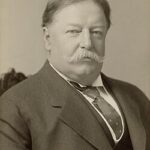The Decision Behind Nicaragua Intervention
President William Howard Taft authorized the deployment of 2,700 U.S. Marines to Nicaragua in August 1912. The Taft military intervention aimed to support the conservative government of Adolfo Díaz. American financial institutions had invested heavily in Nicaraguan railroads and banks. Revolutionary forces led by Liberal Party members threatened these investments. 💰
Dollar Diplomacy in Action
Taft’s decision exemplified his “Dollar Diplomacy” foreign policy approach. This strategy used military force to protect American business interests abroad. The intervention followed a pattern established in previous Central American conflicts. Secretary of State Philander Knox strongly supported the military action. Critics immediately denounced the deployment as imperialism.
International Response and Criticism
Latin American nations condemned the Taft military intervention as sovereignty violation. ⚠️ European powers questioned America’s growing interventionist policies. Anti-imperialist groups in the United States organized protests against the deployment. Congressional Democrats challenged Taft’s authority to send troops without declaration of war. The intervention sparked intense debate about America’s role in regional affairs. 📊
Impact:
Immediate Regional Consequences
The military intervention successfully stabilized Nicaragua’s conservative government temporarily. However, it intensified anti-American sentiment throughout Central America. 🔥 Liberal revolutionaries were defeated but not eliminated entirely. The presence of U.S. Marines created a dependent relationship between Nicaragua and America. Regional leaders began viewing the United States as an imperial power.
Long-term Political Ramifications
The Taft military intervention established a precedent for future U.S. interventions. American forces remained in Nicaragua intermittently until 1933. This prolonged presence contributed to the rise of nationalist movements. The Somoza dynasty later emerged partly due to American influence. 📉 Regional resentment toward U.S. policies grew significantly over subsequent decades.
Economic and Diplomatic Legacy
American financial control over Nicaragua increased substantially after the intervention. U.S. banks gained greater influence over the country’s fiscal policies. The intervention damaged America’s reputation in international diplomatic circles. 🌍 Latin American nations began forming alliances to counter U.S. influence. This military action contributed to the eventual development of the Good Neighbor Policy under later presidents.
